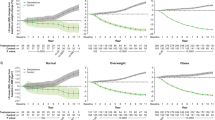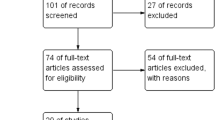Abstract
Background:
Obese men commonly have reductions in circulating testosterone and report symptoms consistent with androgen deficiency. We hypothesized that testosterone treatment improves constitutional and sexual symptoms over and above the effects of weight loss alone.
Methods:
We conducted a pre-specified analysis of a randomized double-blind, placebo-controlled trial at a tertiary referral center. About 100 obese men (body mass index (BMI)⩾30 kg m−2) with a repeated total testosterone level ⩽12 nmol l−1 and a median age of 53 years (interquartile range 47–60) receiving 10 weeks of a very-low-energy diet (VLED) followed by 46 weeks of weight maintenance were randomly assigned at baseline to 56 weeks of intramuscular testosterone undecanoate (n=49, cases) or matching placebo (n=51, controls). Pre-specified outcomes were the between-group differences in Aging Male Symptoms scale (AMS) and international index of erectile function (IIEF-5) questionnaires.
Results:
Eighty-two men completed the study. At study end, cases showed significant symptomatic improvement in AMS score, compared with controls, and improvement was more marked in men with more severe baseline symptoms (mean adjusted difference (MAD) per unit of change in AMS score −0.34 (95% confidence interval (CI) −0.65, −0.02), P=0.04). This corresponds to improvements of 11% and 20% from baseline scores of 40 and 60, respectively, with higher scores denoting more severe symptoms. Men with erectile dysfunction (IIEF-5⩽20) had improved erectile function with testosterone treatment. Cases and controls lost the same weight after VLED (testosterone −12.0 kg; placebo −13.5 kg, P=0.40) and maintained this at study end (testosterone −11.4 kg; placebo −10.9 kg, P=0.80). The improvement in AMS following VLED was not different between the groups (−0.05 (95% CI −0.28, 0.17), P=0.65).
Conclusions:
In otherwise healthy obese men with mild to moderate symptoms and modest reductions in testosterone levels, testosterone treatment improved androgen deficiency symptoms over and above the improvement associated with weight loss alone, and more severely symptomatic men achieved a greater benefit.
This is a preview of subscription content, access via your institution
Access options
Subscribe to this journal
Receive 12 print issues and online access
$259.00 per year
only $21.58 per issue
Buy this article
- Purchase on Springer Link
- Instant access to full article PDF
Prices may be subject to local taxes which are calculated during checkout


Similar content being viewed by others
References
Wu FC, Tajar A, Pye SR, Silman AJ, Finn JD, O'Neill TW et al. Hypothalamic-pituitary-testicular axis disruptions in older men are differentially linked to age and modifiable risk factors: the European Male Aging Study. J Clin Endocrinol Metab 2008; 93: 2737–2745.
Vermeulen A, Kaufman JM, Deslypere JP, Thomas G . Attenuated luteinizing hormone (LH) pulse amplitude but normal LH pulse frequency, and its relation to plasma androgens in hypogonadism of obese men. J Clin Endocrinol Metab 1993; 76: 1140–1146.
Veldhuis J, Yang R, Roelfsema F, Takahashi P . Proinflammatory cytokine infusion attenuates LH's feedforward on testosterone secretion: modulation by age. J Clin Endocrinol Metab 2016; 101: 539–549.
Han TS, Tajar A, O'Neill TW, Jiang M, Bartfai G, Boonen S et al. Impaired quality of life and sexual function in overweight and obese men: the European Male Ageing Study. Eur J Endocrinol 2011; 164: 1003–1011.
Esposito K, Giugliano F, Di Palo C, Giugliano G, Marfella R, D'Andrea F et al. Effect of lifestyle changes on erectile dysfunction in obese men: a randomized controlled trial. J Am Med Assoc 2004; 291: 2978–2984.
Camacho EM, Huhtaniemi IT, O'Neill TW, Finn JD, Pye SR, Lee DM et al. Age-associated changes in hypothalamic-pituitary-testicular function in middle-aged and older men are modified by weight change and lifestyle factors: longitudinal results from the European Male Ageing Study. Eur J Endocrinol 2013; 168: 445–455.
Mora M, Aranda GB, de Hollanda A, Flores L, Puig-Domingo M, Vidal J . Weight loss is a major contributor to improved sexual function after bariatric surgery. Surg Endosc 2013; 27: 3197–3204.
Snyder PJ, Peachey H, Berlin JA, Hannoush P, Haddad G, Dlewati A et al. Effects of testosterone replacement in hypogonadal men. J Clin Endocrinol Metab 2000; 85: 2670–2677.
Snyder PJ, Bhasin S, Cunningham GR, Matsumoto AM, Stephens-Shields AJ, Cauley JA et al. Effects of testosterone treatment in older men. N Engl J Med 2016; 374: 611–624.
Ng Tang Fui M, Prendergast LA, Raval M, Strauss BJ, Zajac JD, Grossmann M . Effects of testosterone treatment on body fat and lean mass in obese men on a hypocaloric diet: a randomized controlled trial. BMC Med 2016; 141: 153–164.
Harwood DT, Handelsman DJ . Development and validation of a sensitive liquid chromatography-tandem mass spectrometry assay to simultaneously measure androgens and estrogens in serum without derivatization. Clin Chim Acta 2009; 409: 78–84.
Heinemann LA . Aging males' symptoms scale: a standardized instrument for the practice. J Endocrinol Invest 2005; 28: 34–38.
Rosen RC, Cappelleri JC, Smith MD, Lipsky J, Pena BM . Development and evaluation of an abridged, 5-item version of the International Index of Erectile Function (IIEF-5) as a diagnostic tool for erectile dysfunction. Int J Impot Res 1999; 11: 319–326.
Heinemann LA Aging Males Symptoms Scale (AMS) Development of the scale. Available at: http://www.aging-males-symptoms-scale.info/documents/Development_of_AMS_scale_review.pdf 2006.
Daig I, Heinemann LA, Kim S, Leungwattanakij S, Badia X, Myon E et al. The aging males' symptoms (AMS) scale: review of its methodological characteristics. Health Qual Life Outcomes 2003; 1: 77.
Vermeulen A, Verdonck L, Kaufman JM . A critical evaluation of simple methods for the estimation of free testosterone in serum. J Clin Endocrinol Metab 1999; 84: 3666–3672.
Giltay EJ, Tishova YA, Mskhalaya GJ, Gooren LJ, Saad F, Kalinchenko SY . Effects of testosterone supplementation on depressive symptoms and sexual dysfunction in hypogonadal men with the metabolic syndrome. J Sex Med 2010; 7: 2572–2582.
Bates D, Maechler M, Bolker B, Walker S . Fitting linear mixed-effects models using lme4. J Stat Softw 2015; 67: 1–48.
Heinemann LA, Moore C, Dinger JC, Stoehr D . Sensitivity as outcome measure of androgen replacement: the AMS scale. Health Qual Life Outcomes 2006; 4: 23.
Bhasin S, Cunningham GR, Hayes FJ, Matsumoto AM, Snyder PJ, Swerdloff RS et al. Testosterone therapy in men with androgen deficiency syndromes: an Endocrine Society clinical practice guideline. J Clin Endocrinol Metab 2010; 95: 2536–2559.
Korenman SG, Morley JE, Mooradian AD, Davis SS, Kaiser FE, Silver AJ et al. Secondary hypogonadism in older men: its relation to impotence. J Clin Endocrinol Metab 1990; 71: 963–969.
Gianatti EJ, Dupuis P, Hoermann R, Zajac JD, Grossmann M . Effect of testosterone treatment on constitutional and sexual symptoms in men with type 2 diabetes in a randomized, placebo-controlled clinical trial. J Clin Endocrinol Metab 2014; 99: 3821–3828.
Isidori AM, Giannetta E, Gianfrilli D, Greco EA, Bonifacio V, Aversa A et al. Effects of testosterone on sexual function in men: results of a meta-analysis. Clin Endocrinol (Oxf) 2005; 63: 381–394.
Yassin A, Doros G . Testosterone therapy in hypogonadal men results in sustained and clinically meaningful weight loss. Clin Obes 2013; 3: 73–83.
Saad F, Yassin A, Doros G, Haider A . Effects of long-term treatment with testosterone on weight and waist size in 411 hypogonadal men with obesity classes I-III: observational data from two registry studies. Int J Obes 2016; 40: 162–170.
Khoo J, Piantadosi C, Worthley S, Wittert GA . Effects of a low-energy diet on sexual function and lower urinary tract symptoms in obese men. Int J Obes 2010; 34: 1396–1403.
Kaukua J, Pekkarinen T, Sane T, Mustajoki P . Sex hormones and sexual function in obese men losing weight. Obes Res 2003; 11: 689–694.
Hammoud A, Gibson M, Hunt SC, Adams TD, Carrell DT, Kolotkin RL et al. Effect of Roux-en-Y gastric bypass surgery on the sex steroids and quality of life in obese men. J Clin Endocrinol Metab 2009; 94: 1329–1332.
Reis LO, Favaro WJ, Barreiro GC, de Oliveira LC, Chaim EA, Fregonesi A et al. Erectile dysfunction and hormonal imbalance in morbidly obese male is reversed after gastric bypass surgery: a prospective randomized controlled trial. Int J Androl 2010; 33: 736–744.
Ng Tang Fui M, Dupuis P, Grossmann M . Lowered testosterone in male obesity: mechanisms, morbidity and management. Asian J Androl 2014; 16: 223–231.
Corona G, Rastrelli G, Monami M, Saad F, Luconi M, Lucchese M et al. Body weight loss reverts obesity-associated hypogonadotropic hypogonadism: a systematic review and meta-analysis. Eur J Endocrinol 2013; 168: 829–843.
Bhasin S, Pencina M, Jasuja GK, Travison TG, Coviello A, Orwoll E et al. Reference ranges for testosterone in men generated using liquid chromatography tandem mass spectrometry in a community-based sample of healthy nonobese young men in the Framingham Heart Study and applied to three geographically distinct cohorts. J Clin Endocrinol Metab 2011; 96: 2430–2439.
Wu FC, Tajar A, Beynon JM, Pye SR, Silman AJ, Finn JD et al. Identification of late-onset hypogonadism in middle-aged and elderly men. N Engl J Med 2010; 363: 123–135.
Dhindsa S, Miller MG, McWhirter CL, Mager DE, Ghanim H, Chaudhuri A et al. Testosterone concentrations in diabetic and nondiabetic obese men. Diabetes Care 2010; 33: 1186–1192.
Acknowledgements
MNTF was supported by a postgraduate scholarship (1055305) and MG by a Career Development Fellowship (1024139) both from the National Health and Medical Research Council (Australia). We are most grateful to Professor David Handelsman and Ms Reena Desai (ANZAC Research Institute, University of Sydney, Australia) for performing the LCMS/MS assay measurements and to Mrs Jenny Healy for assistance with the data collection. Drs Grossmann and Ng Tang Fui had full access to all the data in the study and took responsibility for the integrity of the data and the accuracy of the data analysis. Bayer Pharma AG (Berlin, Germany) provided testosterone, placebo and financial support to conduct investigations, but had no role in trial design, data analysis or writing the manuscript.
Author information
Authors and Affiliations
Corresponding author
Ethics declarations
Competing interests
MG has received research funding from Bayer Pharma, Novartis, Weight Watchers, Lilly and speaker’s honoraria from Besins Healthcare. MNTF has received research funding from Bayer Pharma. The remaining authors declare no conflict of interest.
Additional information
Supplementary Information accompanies this paper on International Journal of Obesity website
Supplementary information
Rights and permissions
About this article
Cite this article
Ng Tang Fui, M., Hoermann, R., Prendergast, L. et al. Symptomatic response to testosterone treatment in dieting obese men with low testosterone levels in a randomized, placebo-controlled clinical trial. Int J Obes 41, 420–426 (2017). https://doi.org/10.1038/ijo.2016.242
Received:
Revised:
Accepted:
Published:
Issue Date:
DOI: https://doi.org/10.1038/ijo.2016.242
This article is cited by
-
Occurrence of pulmonary oil microembolism (POME) with intramuscular testosterone undecanoate injection: literature review
International Journal of Impotence Research (2023)
-
Acute testosterone administration does not affect muscle anabolism
Nutrition & Metabolism (2019)
-
Effect of testosterone treatment on bone remodelling markers and mineral density in obese dieting men in a randomized clinical trial
Scientific Reports (2018)



